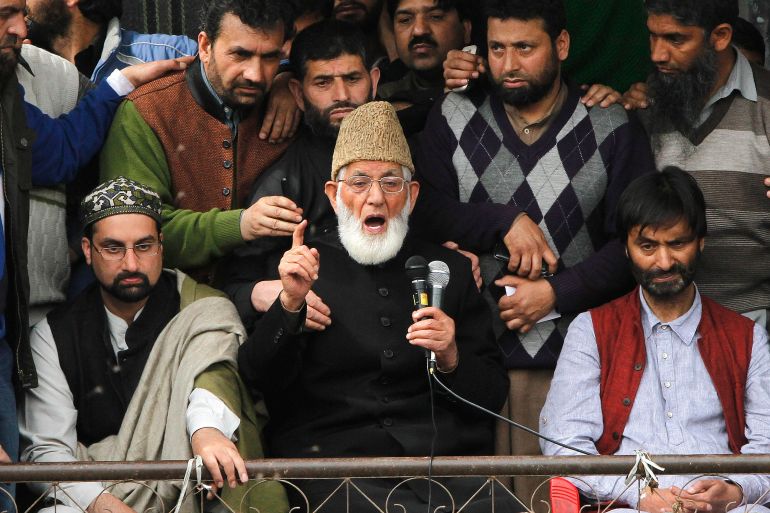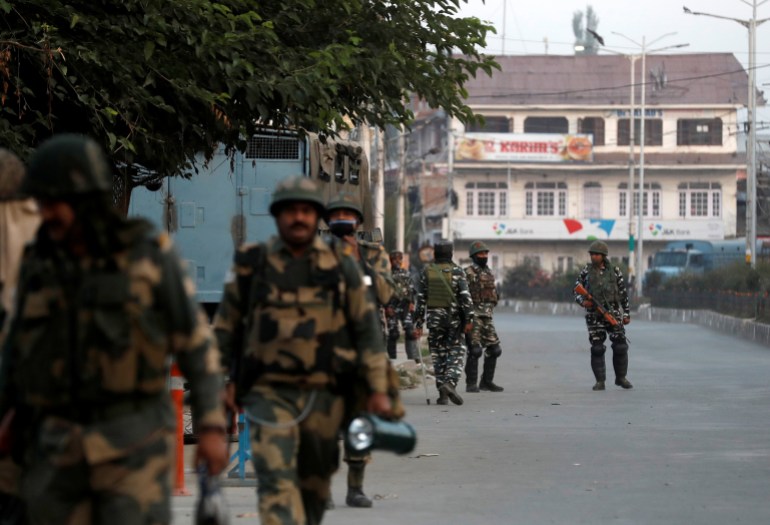India locks down Kashmir after quiet burial of separatist Geelani
Authorities blanket disputed region with troops and clamp down on communications to prevent protests over Syed Ali Shah Geelani’s death.

Syed Ali Shah Geelani, the veteran separatist leader from Indian-administered Kashmir, has been laid to rest as the Indian authorities crack down on public movement and impose a near-total communications blackout to prevent protests.
Geelani, the icon of the disputed region’s resistance against New Delhi’s rule, died late on Wednesday. He was 92.
Keep reading
list of 4 itemsThe Kashmir village that outlawed dowries
Two years after losing special status, how has Kashmir changed?
Q&A: Meeting Modi only added to hopelessness, says Kashmir leader
Geelani was buried in a quiet funeral organised by the authorities under harsh restrictions, his son Naseem Geelani told Al Jazeera.
He said the family had planned the burial at the main martyrs’ graveyard in Srinagar, the region’s main city, as per his will, but “they (police) snatched his body and forcibly buried him”.
“We told the administration that we will bury him at 10am so that our relatives who live in far-off areas could attend,” Naseem told Al Jazeera.
“But they took the body forcefully at 3am and did not allow any of us to take part in the last prayers. They even argued with the women in the family who resisted taking away his body.”
Naseem said it was only at 10am on Thursday that the family members were allowed to see Geelani’s grave.
The Press Trust of India news agency reported that officials buried Geelani’s body and disallowed any mass funeral in anticipation of anti-India protests.

Geelani, who died on Wednesday, had been unwell for some time, his family said.
Icon of Kashmiri resistance
Among the most prominent political leaders in Kashmir – a Himalayan region claimed by both India and Pakistan in full, but ruled in parts – Geelani for years led an umbrella alliance of secessionists, known as the Hurriyat Conference.
The alliance used civil disobedience in the form of shutdowns and protests as a tactic to counter Indian rule.
Very few people in Kashmiri politics have stuck to their beliefs right till the end of their lives. Syed Ali Shah Geelani did. He didn't give up, he didn't give in.
This is the end of a big chapter in Kashmir's politics.— Ashwaq M (@ashwaqM) September 1, 2021
But the Hurriyat Conference split in 2003, when a group of separatists led by Geelani, who advocated Indian-administered Kashmir’s merger with Pakistan, walked out after moderates decided to hold talks with New Delhi.
Geelani strongly opposed any dialogue with New Delhi, a position rejected outright by successive Indian governments who often dubbed him a hardline politician.
He was kept under house arrest more than a decade after leading several anti-India protests.
Around Geelani’s home and elsewhere in Srinagar, armed troops lined main roads and manned checkpoints, as authorities sought to prevent protests following his passing.
Kashmir is back to August 2019 kind of incommunicado. BSNL, landlines snapped too. Other mobile and internet networks were already defunct since midnight.
— Sana Fazili (@FaziliSana) September 2, 2021
The city’s main business area remained deserted, with most shops closed, and the movement of vehicles restricted, the witness said. Authorities also cut internet connections and mobile networks in the Kashmir valley since late on Wednesday.
The clampdown echoes restrictions that were imposed in August 2019 when Indian Prime Minister Narendra Modi split Jammu and Kashmir – then the country’s only Muslim majority state – into two federally administered territories.
The shock move was opposed within Indian-administered Kashmir, including by the likes of Geelani who quit his Hurriyat Conference faction, saying that it had failed to counter New Delhi’s efforts to tighten its grip on the disputed region.